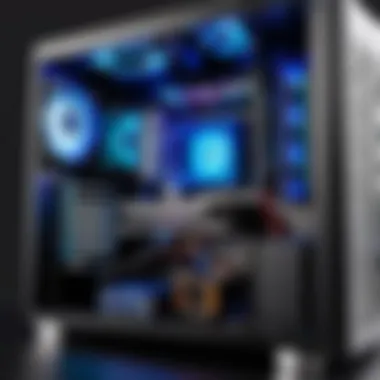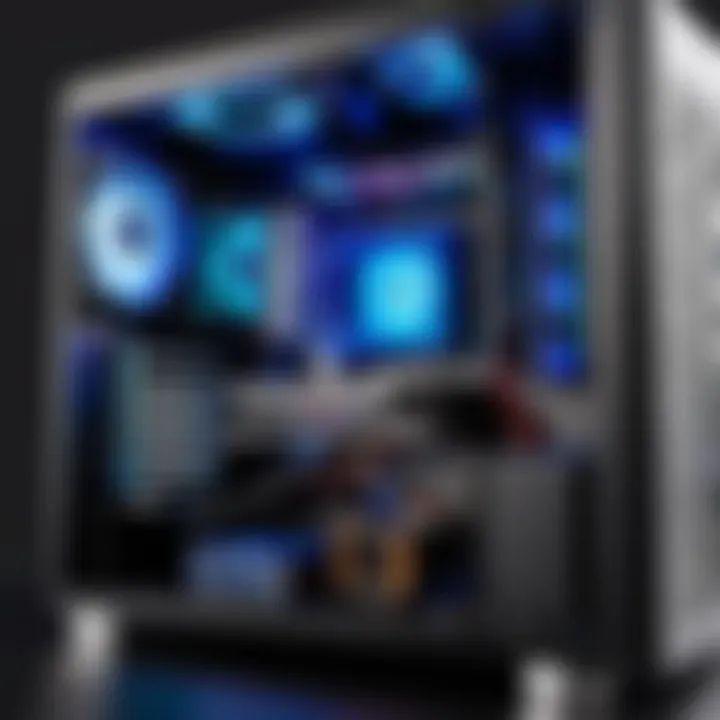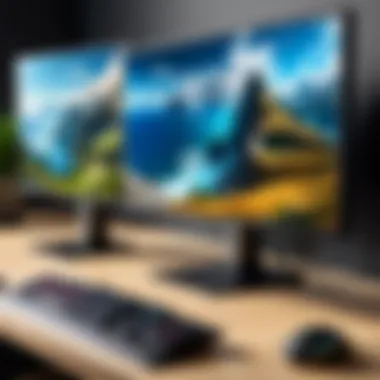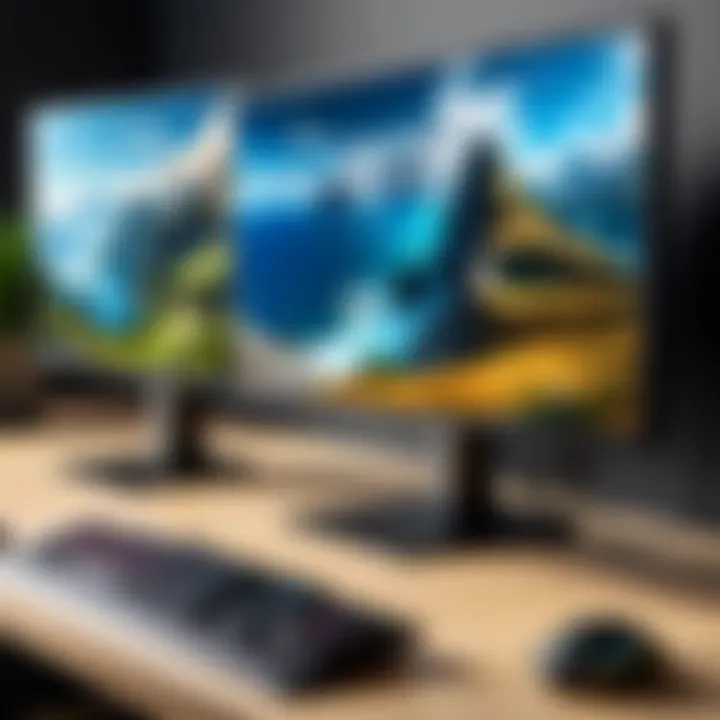Beginner's Guide to Building Your First Gaming PC


Intro
Entering the gaming world opens many doors, especially with the variety of gaming PCs available today. For beginner gamers, understanding what constitutes a good gaming setup can be daunting. From selecting the right components to knowing how software interacts with hardware, each decision shapes the gaming experience. This guide aims to streamline that process, providing foundational knowledge while highlighting essential aspects for a successful entry into PC gaming.
Knowledge about PCs can transform how beginners approach their gaming needs, ensuring they invest wisely and enjoy a seamless experience. The article covers critical insights on specifications, component functionality, and compatibility. Each section will build a clearer picture of what to look for when selecting a gaming PC. As you continue, you will develop a better understanding of how your preferences dictate your choices in the gaming arena.
Preamble to Gaming PCs
The realm of gaming PCs represents a pivotal aspect of the gaming experience, especially for beginners looking to fully immerse themselves in this captivating hobby. Understanding gaming PCs is essential as they differ significantly from standard personal computers. This distinction emerges from various factors, including hardware capabilities, design, and intended use. Gamer-specific machines are built to handle demanding applications that provide smooth graphics and fast processing.
A gaming PC could be the key that transforms a casual gaming experience into something more engaging and immersive. It can influence how games are played, the quality of visuals, and system responsiveness, thereby enriching overall gameplay. This section aims to outline the fundamental aspects that every beginner should grasp.
Understanding the Concept of Gaming PCs
At its core, a gaming PC is designed with performance in mind. Unlike typical computers, gaming systems focus heavily on rendering graphics and processing power. Key components such as the Central Processing Unit (CPU) and the Graphics Processing Unit (GPU) form the backbone of these machines, allowing them to run resource-intensive games smoothly.
Gaming PCs often feature higher RAM capacities too, which is crucial for multitasking and rapid loading times. In addition, storage solutions play a vital role, with Solid State Drives (SSDs) usually favored for their speed over traditional Hard Disk Drives (HDDs). In essence, a gaming PC is tailored to offer the best possible performance, graphics, and responsiveness, ensuring a superior gaming experience.
Evolution of Gaming Hardware
The evolution of gaming hardware illustrates how technology has advanced over the years. In the early days of gaming, systems were limited. Hardware such as CPU and graphics cards were basic. Games typically had simple graphics and low resolution. However, as technology advanced, gaming capabilities expanded rapidly.
Newer graphics cards introduced more cores and better performance. CPUs became capable of handling multiple threads, improving multitasking. This allowed games to become more complex, with richer visuals and intricate gameplay mechanics.
"The history of gaming hardware shows that what once seemed impossible has now become a standard in modern gaming."
The rise of online gaming further spurred hardware advancement. Low latency became a priority, requiring faster components. Moreover, innovations like ray tracing in graphics cards allowed for stunning visual fidelity. With each generation of hardware, there’s a significant leap in capabilities, making it easier for beginners to enter the gaming scene with high-quality experiences.
Determining Your Gaming Needs
Understanding your gaming needs is a crucial step that sets the foundation for the rest of your gaming PC journey. This section aims to clarify what you expect from your gaming experience and how it aligns with the specifications of the PC you’ll be considering.
First, recognizing whether you lean towards casual or competitive gaming greatly affects the choice of components. Your priorities differ based on your gaming habits. Do you play for relaxation or to climb ranks in a competitive environment? This choice informs your selection of CPU, GPU, and more. Additionally, genre preferences also play a significant role.
Casual vs. Competitive Gaming
Casual gaming typically involves a more laid-back approach, focusing on enjoyment rather than performance. Often, gamers in this category enjoy a broad spectrum of game types, such as adventure or simulation. Therefore, their hardware requirements might not need to be cutting-edge. A mid-range graphics card and decent CPU can handle these games efficiently, ensuring a smooth experience without breaking the bank.
On the other side, competitive gaming demands a different setup. Players require lower latency, high frame rates, and superior graphics performance to enhance gameplay in fast-paced scenarios. Thus, investing in higher-end GPUs, CPUs, and even more RAM is essential. This allows for not just visual fidelity but also the critical advantage of responsiveness in genres like first-person shooters.
Genre Preferences and Their Requirements
The genre of games you wish to play should strongly impact your PC configuration choices. Different types of games have varying demands on hardware.


- First-Person Shooters (FPS):
FPS games benefit from high frame rates and low input lag. A powerful GPU and a high refresh rate monitor are crucial. - Massively Multiplayer Online Games (MMOs):
MMOs may not require extreme hardware, but they do need adequate RAM and multitasking capabilities due to their complex environments. - Real-Time Strategy (RTS):
RTS games generally require a decent CPU and RAM to handle multiple units and strategic calculations at once.
In summary, understanding whether you are casual or competitive, and identifying your preferred game genres, helps streamline your decision-making process. This assessment guides component selection, ensuring the final configuration meets your gaming expectations perfectly. By considering these factors, you pave the way for a more satisfying and effective gaming experience.
Key Components of a Gaming PC
Understanding the key components of a gaming PC is essential for beginner gamers. Each part plays a crucial role in your gaming experience. Knowing how these components work together helps in making informed decisions when building or buying a gaming rig. A well-balanced system ensures optimal performance and an enjoyable gaming experience. This section will discuss the different elements that make up a gaming PC and their importance.
Central Processing Unit (CPU)
The Central Processing Unit, or CPU, is often considered the brain of the gaming PC. It handles all the instructions and processes for your system. A strong CPU enhances the overall performance, ensuring smoother gameplay, especially in demanding titles. When choosing a CPU, consider factors like clock speed, number of cores, and generation. Popular choices for gamers include the Intel Core i5 and AMD Ryzen 5 series. These options provide a good balance between price and performance, making them suitable for beginner gaming setups.
Graphics Processing Unit (GPU)
The Graphics Processing Unit, or GPU, is a vital component for gaming visuals. It renders images, videos, and animations, ensuring they look good while you play. The GPU significantly impacts frame rates and graphical settings in games. For beginners, choosing a dedicated graphics card like the NVIDIA GeForce GTX 1660 or AMD Radeon RX 580 is important. Integrated graphics can work for light gaming, but a dedicated GPU helps provide a smoother experience and better graphics.
Motherboard Considerations
The motherboard is the foundation of your gaming PC. It connects all other components and enables communication between them. When selecting a motherboard, make sure it is compatible with your CPU and has enough slots for RAM and other expansion cards. Check for features such as connectivity options, ports, and form factor. Common brands include ASUS, MSI, and Gigabyte, each offering various models that cater to different needs and budgets.
RAM Requirements for Gaming
Random Access Memory (RAM) plays a crucial role in multitasking and performance. For gaming, having sufficient RAM is key to avoiding slowdowns during gameplay. Most modern games recommend a minimum of 8GB of RAM, but 16GB is often ideal for gaming and background tasks. DDR4 RAM is currently the standard, providing better performance and speed. When upgrading, aim for good quality RAM with higher speeds and lower latencies to enhance your system's overall efficiency.
Storage Solutions: SSD vs. HDD
Storage is another important consideration in a gaming PC. You can choose between Solid State Drives (SSD) and Hard Disk Drives (HDD). SSDs are faster and provide quicker load times for games and software. They enhance the overall performance of your system. HDDs, on the other hand, offer more storage space for a lower price, making them suitable for larger libraries. A combination of both is often recommended: an SSD for your operating system and frequently played games, and an HDD for additional storage.
Power Supply Unit (PSU) Essentials
The Power Supply Unit (PSU) supplies power to your entire gaming rig. It is crucial to select a PSU that can handle the power requirements of your components. Look for a unit with an 80 PLUS certification to ensure efficiency and reliability. A properly rated PSU not only powers your setup but also protects against power surges and fluctuations, prolonging the lifespan of your hardware. Ensure that it has the necessary connectors for your GPU and motherboard.
Cooling Systems for Optimal Performance
Maintaining a suitable temperature for your components is essential for their longevity and performance. Overheating can lead to throttling and reduced performance. Various cooling solutions are available, including air and liquid cooling systems. Air cooling consists of fans and heatsinks, which are sufficient for most beginner setups. Liquid cooling offers superior heat dissipation but may be more complex to install. Consider factors such as the size of your case and compatibility with your components when choosing a cooling system.
Building vs. Buying: Which Is Better?
The decision to build or buy a gaming PC is significant for beginner gamers. Each option presents distinct advantages and disadvantages, and understanding these can greatly influence your gaming experience. Building your own PC often provides a level of customization that pre-built systems cannot match. However, pre-built gaming PCs come with their conveniences, allowing users to dive directly into gaming without the associated setup complexities. Here we will explore both avenues to help you make an informed choice.
Benefits of Building Your Own PC
Building your own PC can be rewarding for various reasons:
- Customization Options: You have complete control over the components. This means you can select the parts that best suit your gaming needs and preferences.
- Cost Efficiency: Building a PC may be more cost-effective as you can often find better deals on parts than on pre-built systems.
- Upgradability: A custom-built PC typically allows easier upgrades in the future. You can replace individual components without needing to buy a new machine.
- Learning Experience: The process of building your own PC provides valuable knowledge. You gain insight into how each component works together, and this understanding can enhance your troubleshooting skills.


"Building your own PC not only saves money but also offers a personalized experience that pre-built systems might lack."
Despite the upsides, building does require time and a degree of knowledge about hardware and system integration. Mistakes during assembly can lead to additional costs, but the learning curve can be quite satisfying for many enthusiasts.
Advantages of Pre-Built Gaming PCs
Choosing a pre-built gaming PC can simplify the gaming journey:
- Convenience: These systems are ready to use right out of the box. For beginners, this can reduce the stress associated with selecting parts and the assembly process.
- Warranty and Support: Pre-built systems often come with warranties and customer support, protecting your investment and providing peace of mind.
- Time-Saving: Purchasing a pre-built machine can save significant time. You can focus on gaming rather than spending hours researching and assembling parts.
- Trusted Configurations: Many manufacturers optimize their builds for performance. This means you are more likely to receive a balanced system without the worry of compatibility issues.
When considering a pre-built gaming PC, be aware that customizability may be limited compared to building your own. Additionally, pre-built systems can be pricier because you are paying for labor and assembly, but for those seeking simplicity, this can be a viable option.
Essential Peripherals for Beginner Gamers
When assembling a gaming PC, many beginners often prioritize the internal components over essential peripherals. These devices can significantly influence the overall gaming experience. Investing in quality peripherals can enhance gameplay, provide comfort, and improve performance. Understanding how each peripheral contributes is vital for making informed decisions.
Monitors Specifications for Gaming
The monitor is one of the most important peripherals for gamers. It serves as the primary interface between the player and the game. Screen resolution is a critical specification to consider. Higher resolutions, such as 1920x1080 (Full HD) or even 2560x1440 (2K), provide sharper images. Refresh rate is another crucial aspect. Monitors with higher refresh rates, like 144Hz and above, offer smoother motion, reducing motion blur in fast-paced games. Additionally, look for monitors with a low response time, typically under 5ms, as this helps minimize lag and enhances performance.
Consider the connectivity options as well; HDMI and DisplayPort are common connections found on gaming monitors. A monitor with multiple input options increases versatility, allowing gamers to connect different devices easily.
"A good monitor can elevate your gaming experience far beyond basic graphics capabilities."
Choosing the Right Keyboard and Mouse
The keyboard and mouse are essential for control and interaction in gaming. Mechanical keyboards are often preferred for gaming due to their tactile feedback and durability. They usually offer customizable key switches that personalize the feel and response. RGB lighting can also enhance the aesthetic appeal and help with orientation during gameplay in low-light environments.
For mice, look for options with adjustable DPI settings. Higher DPI allows faster movement and more precision. Having programmable buttons can also be advantageous in complex games, enabling quick access to different commands without disrupting gameplay.
Audio Equipment for Immersive Experiences
Audio quality can greatly affect immersion. Investing in a good headset or speakers ensures that players experience higher fidelity sound. A surround sound headset can enhance spatial awareness in games, providing a competitive edge by revealing enemy locations through audio cues. Wireless headsets offer freedom from cables, while wired options are usually more reliable with no battery concerns. Look for audio devices that provide comfort during long sessions, as proper padding and light design help reduce fatigue.
Gaming Chairs: Comfort and Ergonomics
Comfort should not be overlooked, especially during extended gaming sessions. Gaming chairs are designed to support proper posture and reduce discomfort. Look for adjustable features that allow personal customization, including seat height and armrest positioning. Chairs with lumbar support can help maintain spinal health, preventing long-term issues. Materials matter too; breathable fabric can increase comfort, reducing sweat during intense sessions. Investing in a quality gaming chair pays off in health benefits and better focus during gameplay.
In summary, essential peripherals play a crucial role in the beginner gaming experience. Each provides unique benefits that enhance gaming, from clarity and responsiveness to comfort and immersion. Consider these elements carefully to create an enjoyable and effective gaming setup.
Software Considerations
In the realm of gaming, the right software plays a crucial role in shaping the overall experience. This section delves into the software considerations that beginners should understand while constructing their gaming setup. From operating systems to essential gaming software, knowing these elements can enhance the performance of a gaming PC significantly.


Operating Systems and Gaming Performance
Choosing the right operating system (OS) can impact gaming performance in various ways. Windows, for instance, dominates the gaming landscape. This is largely due to the extensive compatibility it offers with games and drivers. Many games are developed with Windows as the primary platform in mind.
When selecting an OS, consider the following:
- Compatibility: Most popular games are available on Windows. This is less true for macOS or Linux.
- Performance: Windows updates are frequent, which can sometimes affect performance negatively. It's essential to manage updates wisely.
- User Interface: Different OS versions offer varied user interfaces. Windows is commonly preferred due to its straightforward navigation for gamers.
For those leaning towards less mainstream systems like Linux, it may be challenging to find support for many games. However, alternative platforms like SteamOS attempt to bridge this gap. Taking all these factors into account is vital.
Essential Gaming Software and Platforms
In addition to an appropriate operating system, beginners must install several key gaming software programs to maximize their PC's potential. Here are some of the essential elements:
- Game Clients: Platforms like Steam or Epic Games Store are crucial for accessing a vast library of games. They not only handle game installations but often provide updates and community features.
- Driver Software: Keep graphics drivers updated to ensure optimal performance. Companies like NVIDIA and AMD frequently release updates to enhance gaming capabilities.
- Monitor and System Metrics: Applications such as MSI Afterburner can be useful for monitoring system performance during gameplay. This includes frame rates and temperatures.
- Voice Communication Software: Programs like Discord serve as key tools for communication, especially in multiplayer gaming.
Additionally, regularly check for updates on your gaming software. Not only does this apply to game clients, but also to the operating system.
"The correct software setup is just as important as the hardware itself. A powerful gaming rig may perform poorly without optimized software."
Maintenance and Upkeep
Maintaining your gaming PC is essential to ensure optimal performance and longevity. With the rapid advancements in gaming software and hardware, a well-maintained system can greatly enhance your gaming experience. Proper maintenance can prevent hardware failures, software issues, and can keep your system running smoothly.
Managing Software Updates
Regular software updates are crucial for both the operating system and your gaming applications. These updates often include bug fixes, performance improvements, and security enhancements. Without these updates, your system might fall victim to vulnerabilities or experience compatibility issues with new games.
- Operating System Updates: Regular updates for your operating system, whether it is Windows, macOS, or another, ensure that you have the latest features and security patches. Enable automatic updates if possible, so you do not miss critical updates.
- Game Updates: Many games frequently release updates to fix bugs or introduce new content. Keeping your games updated ensures that you benefit from the latest features and improvements. Check the game client or launcher regularly, like Steam or Epic Games Store, for updates.
- Driver Updates: GPU drivers are exceptionally crucial for gaming performance. Manufacturers like NVIDIA and AMD release regular updates to optimize performance for new games. Updating your graphics card drivers can lead to enhanced graphics and smoother gameplay. Consider software like GeForce Experience or AMD Radeon Software that helps manage these updates effectively.
Cleaning and Physical Maintenance
Physical maintenance of your gaming PC is just as important as software upkeep. Over time, dust and grime can accumulate inside your case, leading to overheating and performance throttling. Regular cleaning ensures that your components operate efficiently and have a longer lifespan.
- Dusting the Components: Power down your PC and unplug it. Use compressed air to blow out dust from the fans, heatsinks, and other components. Pay special attention to the GPU and CPU fans. Ensure that you do not touch any components directly with your hands to avoid static shock.
- Cable Management: Keep the internal cables organized. Untidy cables can impede airflow, leading to overheating. Using zip ties or cable sleeves can help create a cleaner look and improve cooling efficiency.
- Checking Hardware Connections: Occasionally check that all cables and components are securely connected. Loose connections can lead to hardware failures or inconsistencies in performance.
- Replacing Thermal Paste: The thermal paste between the CPU or GPU and their heatsinks wears out over time. Consider replacing it every few years or when you notice higher temperatures during gaming sessions. This simple action can dramatically lower temperatures and improve performance.
By managing software updates and performing regular cleaning and physical maintenance, you can enhance your gaming experience significantly and prolong the life of your gaming PC.
Ending
In summation, the topic of the conclusion holds significant weight within the context of this guide. It serves not only as a wrap-up of the essential concepts discussed throughout the article but also as an opportunity for reflection. Evaluating the journey a gamer has taken is important. Each individual's experience in gaming is unique, influenced by personal tastes, preferences, and the demands of the hardware used. Understanding the skills gained and the joy of gaming can foster a deeper appreciation of the chosen gaming path.
Evaluating Your Journey as a Gamer
As you finish setting up your gaming rig, it's vital to take a moment to assess your gaming journey. What has drawn you to gaming? Was it the thrill of competition, the beauty of storytelling, or the community aspects? Evaluating these motivations is essential to shaping your experience. Consider what types of games you enjoy and how your hardware supports those preferences. Gamers often find that taking time to reflect on their skills and experiences, whether they are new or seasoned, can lead to better gaming choices in the future.
Future Trends in Gaming Hardware
Looking ahead, the landscape of gaming hardware is evolving rapidly. New technologies emerge frequently, and they can drastically enhance gaming experiences. One noticeable trend is the shift towards more powerful GPUs, with manufacturers like NVIDIA and AMD continuously pushing the boundaries of graphical power. Moreover, the rise of cloud gaming and virtual reality introduces novel ways to interact with games that were previously unimaginable.
Anticipating these changes is key for any prospective gamer. Hardware requirements will routinely evolve, necessitating upgrades to fully enjoy future games. Keeping an eye on these trends can help both casual and competitive gamers stay at the forefront of gaming technology and maintain optimal performance.







